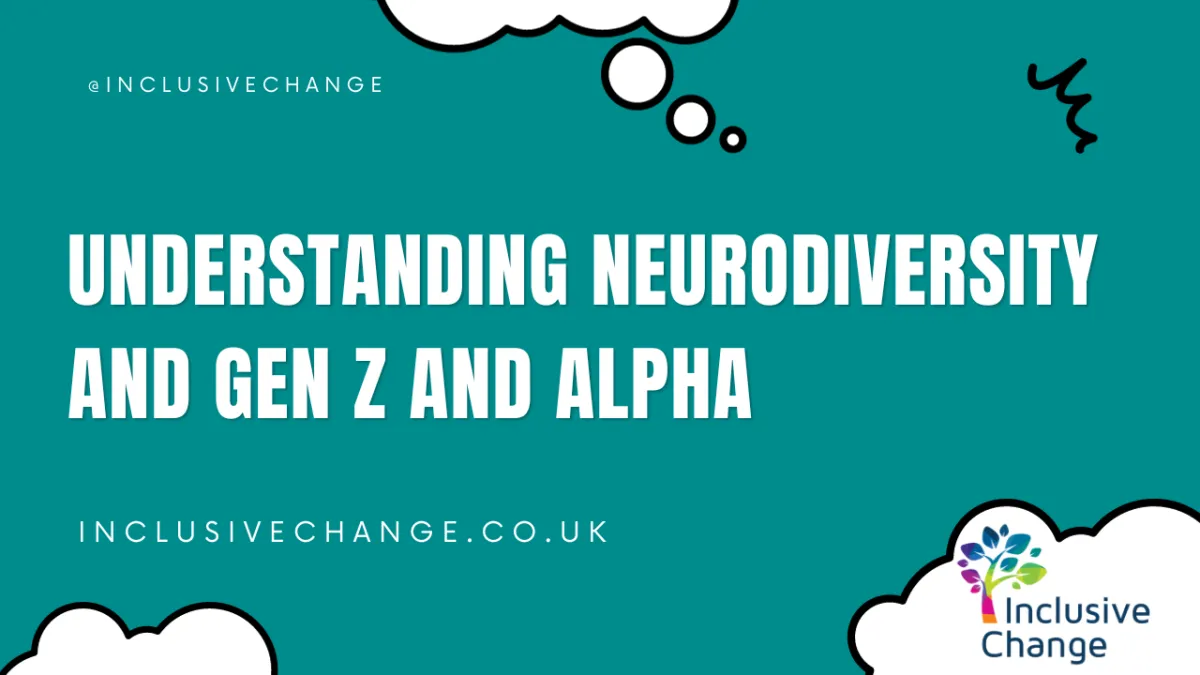
Daniel Biddle
Motivational Speaker, Disability Law Expert
Empowering Neurodiversity in the workplace
Daniel Biddle
Daniel is a highly experienced accessibility consultant with extensive experience of disability. Daniel has particular expertise in acquired disability, including acquired neurodiversity.
He established the National Disability Employment & Advisory Service in 2022 and focuses on supporting neurodivergent young people & adults into employment.

Work with me
Ready to transform your understanding of disability law and equity in the workplace?
Would you like me to run a workshop for you?
Get in touch using my contact email above.
Read my blog here: https://inclusivechange.co.uk/blog/b/5-things-to-learn-from-daniel-biddle-disability-advocate--77-survivor
Read more
The blog

Understanding generation z, generation alpha and neurodiversity
Navigating the Present and Preparing for the Workforce of Tomorrow: Understanding Generations Z and Alpha
Facing hidden challenges of the most anxious and possibly neurodiverse generation.
This week I have been having a lot of conversations about the future of work and more specifically the future workforce.
I always intended Inclusive Change to help organisations understand how to build the future of work with neurodiversity in mind. Understanding generational differences in teams has been something we think will become more important for organisations.
Gen Z are part of the workforce now and Gen Alpha will be in the workforce in a few years from now. This generation have grown up in the 21st century are the most social, the most empowered, and also the most anxious youth population in human history. If you are struggling to connect with and lead them, you are not alone.
Both generational groups have experienced a lot, so much that they will have different expectations of the workplace and their employers. In fact it is likely that many don't see traditional employment as a route - they may see entrepreneurialism or freelancing as an option.
As a neurodiversity focussed organisation at Inclusive Change we meet and work with students, teachers, academics and employers who see a direct link between understanding neurodiversity and unlocking talent in Gen Z and Gen Alpha.
So, let’s do a bit of unpacking of what we are talking about.
Who or what is Generation Z and Generation Alpha
If you have heard of the terms “Boomers” or “Millenials” then you will be familiar with a phrase or term that represents an age group, born into a generation that has similar experiences across the decades. I myself am a generation x’er - born in the 1970’s. I experienced life before tech became a thing, I can even remember a time when TV only had 3 channels and the test card was on until mid morning at least.
Generation Z is defined as those born between 1997 & 2000. They are the first generation to not know a life without tech, granted it was the early days but by 1999 babies were born into a world worrying about the millennium bug. They grew up and became teenagers during a great recession from 2008, along with other issues like terrorism and climate change.
Tim Elmore & Andrew Peak write about generation Z in their book Generation Z unfiltered.
Generation Alpha children were first born in 2010 (it does vary depending on whose research you review as some say 2016). Nevertheless, this this a generation that is defined by accesssible tech - the first iPad was launched in 2010, social media, influencers, austerity and more recently Covid.
Generation Z are already in and joining our workforce now and Generation Alpha are teenagers now but are looking to starting careers in the next 5 - 7 years.
Understanding neurodiversity = unlocking new talent
Neurodiversity, at its core, is a concept that recognises that all brains are different and all brains should be valued. Neurodiversity describes the infinite variety of human neurocognition in that biologically, everyone’s brain works slightly differently. Where an individual’s cognitive functioning is different from societial expectations we use the term neurodivergent. Some of the conditions that fall under the umbrella of neurodivergence are autism, adhd, dyslexia, Tourettes, dyspraxia and mental health conditions.
Understanding of neurodivergence is increasing and with this we are seeing increasingly more adults and young people identifying as neurodivergent, whether that is through formal diagnosis or self identification. It is currently estimated that approximately 20% of our population are neurodivergent.
There are many benefits to embracing neurodiversity in organisations and some of these will be very much linked to talent identification and recruitment and retention of generation z and generation alpha. Those benefits include increased innovation, business growth, enhanced reputation in your community and with your clients and increased staff engagement.
With increased understanding of neurodiversity particularly in younger generations it is likely that we are going to see an increase in neurodivergent employees within our workforce. We will also see more adults advocating for neurodiversity friendly organisations, services and employers.
So a conclusion can be drawn that employers and organisations need to include neurodiversity as part of their future people strategy. To ensure that we can offer inclusive workplaces that are attractive to the generations z and alpha.
Embracing generational diversity and neurodiversity
it's clear that embracing neurodiversity is crucial for creating inclusive workplaces that resonate with Generation Z and Alpha. Utilising the strengths of all generations will lead us to greater success.
By understanding and celebrating neurodivergent perspectives, we unlock a wealth of untapped talent that can drive innovation, foster business growth, and enhance our relationships within the community. Coupled with the wisdom of more experienced colleagues we will lead incredible teams.
At Inclusive Change we want to help you harness the power of your neurodiverse teams. Together, we can build a future of work that not only accommodates but truly celebrates the rich diversity of minds in our workforce. Join us at inclusivechange.co.uk, and let's shape a future where everyone thrives.
Support the future, educate yourself. Here are some kindle downloads we would recommend on this topic:
Column Header
Lorem ipsum dolor sit amet consecetuer lorem ipsum
Organically grow the holistic world view of disruptive innovation
At the end of the day, going forward, a new normal that has evolved
Column Header
Lorem ipsum dolor sit amet consecetuer lorem ipsum
Organically grow the holistic world view of disruptive innovation
At the end of the day, going forward, a new normal that has evolved
Column Header
Lorem ipsum dolor sit amet consecetuer lorem ipsum
Organically grow the holistic world view of disruptive innovation
At the end of the day, going forward, a new normal that has evolved
Some of the Organisations Inclusive Change Have Worked With


Inclusive Change Ltd
The Brightwell, Bradbury House
Wheatfield Drive
Bradley Stoke, Bristol
BS329DB
VAT NO: 352 1564 17
ICO Reg: ZB081779
UK Register of Learning Providers: 10090652
Copyright 2023 - Inclusive Change Ltd

